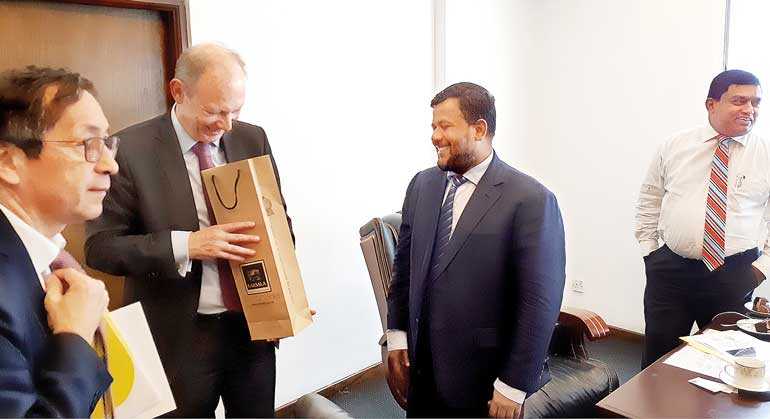Wednesday Feb 18, 2026
Wednesday Feb 18, 2026
Tuesday, 10 July 2018 00:11 - - {{hitsCtrl.values.hits}}
 Industry and Commerce Minister Rishad Bathiudeen (centre) meets Ambassador of the Delegation of EU to Sri Lanka Tung-Lai Margue (far left), and European External Action Service (EEAS) Brussels Asia Trade Division Head Peter Bersz (second from left) joined by Industry and Commerce Ministry Secretary KDN Ranjith Ashoka (far right) on 5 July
Industry and Commerce Minister Rishad Bathiudeen (centre) meets Ambassador of the Delegation of EU to Sri Lanka Tung-Lai Margue (far left), and European External Action Service (EEAS) Brussels Asia Trade Division Head Peter Bersz (second from left) joined by Industry and Commerce Ministry Secretary KDN Ranjith Ashoka (far right) on 5 July
Sri Lanka soft-launched an international support call for its export-led industrialisation initiative on 5 July.
“The Ministry of Industry and Commerce is in the process of developing relevant policies conducive for export led industrialisation, as envisaged in the Vision 2025 of the Government,” said Industry and Commerce Minister Rishad Bathiudeen on 5 July at the Ministry office, Colombo 3. Minister Bathiudeen, joined by his top officials, advisors and Bridging the Gap Foundation Asia Secretary General and former UN ESCAP Director and Chief Economist Dr Ravi Ratnayake, was addressing Ambassador of the Delegation of EU to Sri Lanka Tung-Lai Margue, who was leading a team of EU officials to meet Minister Bathiudeen at the Ministry office. The session was in view of Minister Bathiudeen’s submission of UNIDO collaborated proposal, calling for assistance to support export-led industrialisation in Sri Lanka, to Ambassador Tung-Lai Margue and the EU delegation at EU-SL working group on Trade and Economic Cooperation Relations.
“This vision includes establishing new industrial estates and modernising new ones,” Minister Bathiudeen said, and added: “Both developed, advanced and developing economies used industrialisation as the engine of growth and development. They adopted appropriate industrial policies and strategies to guide their industrialisation. Currently, Sri Lanka does not have such a policy document. A clear indication of this absence is the declining share of manufacturing in GDP, which is stuck at 16.7% - well below South East Asian countries such as Thailand, where the share is 27%. Though there were past attempts to revive industrialisation in Sri Lanka, a proper industrial policy and comprehensive strategy for its implementation are yet to be developed. The importance of such a policy has been recognised in the new Trade Policy recently approved by the Cabinet. It is also the action-plan for 2015-20 of the Ministry of Industry and Commerce.”
“This is a very ambitious project. While these proposals are pro-development, it is important that they are well aligned with Vision 2025,” stressed Ambassador Tung-Lai Margue, responding to Minister Bathiudeen, and added: “The value chain integration suggestions here too are useful. We also suggest Sri Lanka should integrate closer with value chains of South Asian region, as a start.”
European External Action Service (EEAS) Brussels Asia Trade Division Head Peter Bersz said that the proposals are comprehensive. “The discussions were important. We will go back to Brussels to take a closer look at the proposals and see how to respond. At this moment, this is very much of a Sri Lankan internal document, but we believe engaging a broader stakeholder base such as other governments, export and import companies, traders and manufacturers, can enhance this even further, and this is a good and much-needed start for such a level of engagement. Also, this policy paper appears to be an industrial strategy too, which is another interesting aspect.”
Unlike previous industry development policies, the comprehensive set of proposals submitted by Minister Bathiudeen on 5 July packs, among others, steps on increasing Sri Lanka’s competitiveness for production and trade promotion, formulation of intellectual property policy and on geographical indicators, consumer protection, transforming industrial estates to drive SME development for export growth, enhancing capacity and competitiveness of SMEs in export-oriented value chains, and even proposals to improve national quality infrastructure.